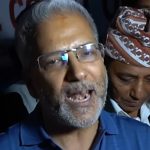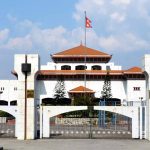
Two prominent Rastriya Swatantra Party (RSP) members have called the move against Dr. Mukul Dhakal a mistake and called for a “course correction.” They have urged Dhakal’s reinstatement in a letter addressed to acting chairman Dol Prasad Aryal.
Central party figures Rajesh Timsina, the chairman of Koshi Province, and Tapeshwor Yadav, the chairman of Madhesh Province, are calling for a change in direction.
Timsina made it plain in a letter he wrote on Tuesday that he had not signed the decision to deport Mukul. He maintained that the future of alternative politics and the aspirations of the Nepali people are at risk, and that the RSP is currently dealing with its worst crisis. Timsina called the events since the middle of June “sad and unfortunate.”
He further underlined that RSP workers in Koshi Province had voiced similar worries and that the party had weakened after Dhakal’s departure. Timsina proposed that in order for the parties to proceed together, corrective action was required. He consequently refused to support measures that would have removed Dhakal from his roles as ordinary member, central committee member, spokesperson, and general secretary. Timsina indicated his belief that Dhakal ought to be returned to his prior duties and that such acts are permitted by the party’s “Right to Recall” clause. Along with calling for unity inside the party, Timsina urged all parties to put aside their differences and cooperate during this crucial period.
Sources claim that Yadav, the chairman of Madhesh Province, also retracted his signature on the ruling, pointing out the harm done to the party by acts done without good cause. However, Yadav did not specifically mention Dhakal in his remarks, but he did voice support for the party’s continued unity. While Yadav allegedly sent his letter straight to Acting Chairman Aryal, Timsina shared it on a social media group for members of the central committee.
Kabindra Burlakoti, the RSP’s acting general secretary, acknowledged that Timsina was the letter’s sender but clarified that Yadav was not. Burlakoti brushed down the problem, saying it wasn’t important enough to talk about further. He underlined that more urgent issues should be the main emphasis of the central committee meeting, which is scheduled for January 3–5.
Will the central committee hold a discussion?
Burlakoti rejected the necessity for debate, claiming that the party’s central and disciplinary committees had already made a decision on the matter. This view was mirrored by Joint Spokesperson Ramesh Prasai, who contended that the issue had been settled through the correct procedure and did not call for additional discussion.
But Timsina was adamant that the topic be brought up at the central committee meeting, claiming that it had started there and should be handled appropriately.
Can a “course correction” be made?
In light of Dhakal’s contribution to party building, Timsina maintained that his reinstatement was imperative. He compared the gathering to a family, in which Dhakal played the role of mother and Rabi Lamichhane the role of father. Timsina proposed that even though they had had some arguments, it was time for them to be back together.
Given the continued difficulties the government and the party leadership are facing, he cautioned that if a course correction is not made, the party will become much more vulnerable. Timsina said that the party’s strength would depend on cooperation, underscoring the value of unity during trying times.
Yadav endorsed this viewpoint as well, saying that moving forward together was the only option. He emphasized that party leaders must examine themselves and make a commitment to unity.
The role of Acting General Secretary Burlakoti
Burlakoti, the acting general secretary, insisted that the central committee’s decision could not be overturned. He stated that the party will not alter its position in response to personal views and that the decision had been made democratically and in compliance with party regulations. Burlakoti declared that those attempting to change the decision would not be able to influence the party.
The notion of a course correction was also rejected by Joint Spokesperson Prasai, who maintained that the party’s decision had been made in accordance with its policies and guidelines. He said that there was no need for additional adjustments because any incorrect choices would have been dealt with through the disciplinary procedure.
The moment for “course correction” is drawing near.
The controversy’s focal point, former general secretary Dhakal, feels that a change in direction is urgently needed.
At least now, someone has begun to stand up and admit that there was an error. “First of all, nobody said a word when the insulting action was taken against me,” Dhakal stated. I think that other members of the party, who are knowledgeable, will also voice their opinions in this manner.
Dhakal added that the point of course correction would logically follow the court’s decision because the subject had already entered the legal system. He stated unequivocally that he would own up to his mistakes and offer an apology if the court determined Lamichhane was innocent. But if Lamichhane is convicted, it would support his position and pave the way for him to rejoin the group.
“My stance will be upheld if the court finds Rabi guilty,” Dhakal stated. “We must abide by the court’s ruling as a party that upholds the rule of law.” And if it’s correct, shouldn’t the person who acted against me receive the same respect in return?”








